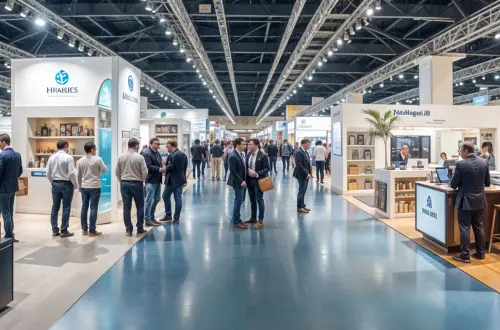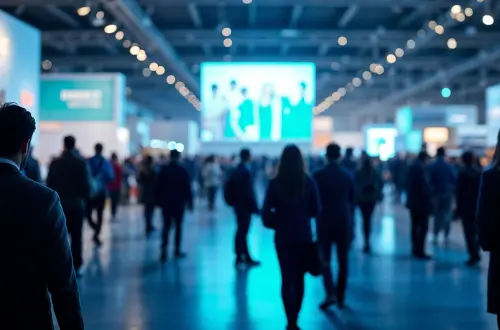IFAT Munich 2022 - The Strong Restart of the Climate Protection Fair
IFAT Munich 2022 marked the successful and much-needed restart of the environmental industry. It was held as a live event in Messe Munich between 30.05.2022 and 03.06.2022. It featured a high attendance level that approached pre-Covid levels. Around 50% of the participants represented foreign countries. 2,984 exhibitors and approximately 119,000 visitors from 155 nations attended. The key topics included the circular economy and the industry's future. The hosting location for the event did not feature strict Covid-19 safety measures. This was because of Germany's improved epidemiologic situation.
IFAT 2022 was held as a live event in Messe Munich in Germany. Attendees were advised to follow several recommendations, such as wearing an FFP2 mask in indoor spaces. They were also advised to maintain a safe distance of 1.5 metres during the event. Furthermore, performing regular hand hygiene was encouraged. They could perform the task by using the provided disinfection stations. Messe Munich featured strict hygiene standards. Among them was ensuring the continuous circulation of the air within the venue. Additionally, the site received frequent sanitation. The cleaning teams emphasised high-touch areas.
IFAT 2022 featured many highlights. This included multiple sub-events that focused on the latest trends and innovations. The key themes were the circular economy and the future of the industry. The sub-themes included the outlook of water, intelligent drives, and sustainable cities. Among the highlights were:
- The opening keynote
- The presentation stages
- The special areas
- The solution tours
- The live demonstrations
- The Start-up Area
One of the lead highlights of IFAT 2022 was the opening keynote. It inaugurated the trade fair on 30.05.2022 and occurred at 11:00 at the Forum Water/Sewage located in Hall C3. Two Environment Ministers hosted the inauguration: Steffi Lemke and Thorsten Glauber. Following the inauguration was a panel discussion on creating change. This included transitioning from environmental activism to environmental solutions and politics. The debate featured representatives, such as Mikela Druckman. They also featured Ren Xiaoyuan, the UN Young Champion of the Earth for 2020. Sucheta Govil, the CCO of Covestro, was also among the participants in the discussions. So was Pr. Dr Erich Zahn, co-author of “The Limits of Growth”.
Among the highlights were the two forums and the Innovation Stage. The forums were the“Forum Waste/Secondary Raw Materials and the Forum Water/Sewage. Forum Waste was hosted in Hall A5. It discussed several subjects. Such included sustainable product design, chemical handling and lithium-ion battery handling. A series of panel discussions, keynotes and lectures discussed the topics. Among the programme highlights were the lectures:
- Recycling phosphorus
- The hazardous substances within existing buildings
- Generating and applying hydrogen from municipal waste
- Is the new Waste Shipment Regulation a milestone for Europe’s Circular Economy?
- Chemical recycling as a circular economy building block
“Forum Water” was held in Hall C3. It debated several topics, such as water-conscious cities and clean drinking water. It further discussed industrial water cycles and coronavirus wastewater monitoring. Its highlights included:
|
|
The “Innovation Stage” was also among the presentation sub-event highlights of IFAT 2022. It was held in Hall B4. It was the meeting location for exhibitors, associations, and partner institutions. They discussed various topics, such as waste management data analytics. Participants also observed or presented diverse innovations. The highlights of the programme were:
- The future of wastewater management
- The benefits of using data analytics in waste management
- Is titanium dioxide of relevance to demolition sites?
- Using plastic sorting markers
- How can companies improve their recycling practices via digital waste management?
- Secondary building materials QA and certification
- The potential and role of recycling building materials
- Technology development in water analytics
- The importance of digitising modern sorting plants
The Start-up Area in Hall B4 was also among the event highlights. It comprised two areas. These were an exhibition area for start-up companies and the Innovation Stage. The 50 start-up companies featured in the area represented around 16 nations. The innovators displayed solutions and products related to several key topics. These included water and wastewater treatment. They also featured air pollution control. Examples of the presented wares included sustainable asphalt additives created via plastics recycling. They also incorporated microplastic separators for wastewater streams and a dust-binding biotechnological method. The featured innovations likewise featured a nanotechnological process for water treatment. Among the exhibitors of the Start-up Area were the companies:
|
|
There were four specialised areas dedicated to the central theme of the circular economy. These included:
- The Process World Plastics Recycling
- The Best Practice Circular Economy—the Material Flow of Plastics
- The Circular Economy of Minerals and Sustainability in Construction
- The Hydrogen in and from the Circular Economy
Each of the specialised areas focused on a particular aspect of the circular economy. The respective sub-event featured them as a central theme. For example, The Process World in Hall B5 focused on plastics recycling. It showed plastic recycling stages using a shampoo bottle as an example product. This included its disposal and recycling into new packaging material. The specialised area took place under the maxim “We make circular economy happen!”
The "Best Practice Circular Economy" area presented the best plastics treatment practices. It occurred as a collaboration between organisations such as IK and BDE. The location was Hall A6, and the sub-event featured two sections. One was an exhibition on plastic treatment materials, approaches and solutions. The second section featured various lectures, talks, and discussions. The exposition took place under the maxim “Too precious to waste - Too good to throw away”. It featured 16 companies. Each presented its best practices. The discussion section included 18 lectures, including the sessions:
- A holistic view of Plastics Credits and EPR
- Innovations and alternatives in plastics recycling
- Climate protection and incinerating waste - do they contradict one another?
- The technical possibilities of unpacking food waste
- Recycling tires and rubber - a nigh-forgotten material flow
Hall B4 was the location of the "Minerals and Sustainability in Construction" area. It presented various disposal of building construction pollutant methods. It also examined how to reuse recyclable building materials. The zone included live shows and technical presentations. Among the sessions included in the technical presentations were the lectures:
- Secondary building materials in the ARGE-ALP regions
- The construction waste of today is the building materials of tomorrow
The "Hydrogen in and from the Circular Economy" area was in a dedicated outdoor space. It presented hydrogen production wastewater solutions and application possibilities.
The novel solution tours were among the central highlights. They ranged from 60 to 90 minutes. Each began with a keynote speech on the trending topic, followed by a guided tour to up to five booths. The solution tours focused on several subjects, distributed in three trending topic groups:
|
|
The seven live demonstrations were also a lead highlight of IFAT 2022. A dedicated outdoor area served as their show stage. The featured demonstrations were:
- Car Recycling
- Crushing Zone
- Demonstration Days Biomass
- Truck in Action Show
- Water Skills - Professional Competitions
- Pipe Fitting Challenge
- Sustainable Road and Sewer Construction Live
The “Car Recycling” demonstration presented the dismantling of end-of-life cars into individual parts. The live show showed novel recycling technologies for electromobility and metal recycling. This allowed attendees to observe the recovery of such materials. The demonstration featured six stages. These were:
- Sustainable end-of-life vehicle storage
- Recyclable spare part removal
- Hazardous component removal and disposal
- Liquid removal and disposal
- Sorting procedures
- Transport compression
It was a must-attend to shredding facilities and dismantling companies. Likewise, it was beneficial for municipal and local authorities.
The “Crushing Zone” presented demolition waste recycling in three steps. The stages were demolition, crushing and materials preparation. Attendees were able to learn about the processing of such materials during the demonstration. It also allowed them to discuss optimal solutions. The “Demonstration Days Biomass” presented large mobile machinery for biomass processing. It also showed the recycling potential of such waste. Attendees could also learn how to create optimised workflows.
The “Truck in Action Show” showed the latest innovative municipal vehicles and superstructures. This included how attendees could reduce labour and optimise performance. The area distributed the innovations into several working groups:
- Waste collection vehicles
- Skip loader and roll-off trucks
- Containers and cranes
- Liquid waste disposal and pipe cleaning systems
- Sweeping vehicles and equipment
- Winter service vehicles and equipment
The “Pipe Fitting Challenge” also allowed professionals to gain recognition. It featured several teams competing in complex pipe system construction. For the task, they had to use cast iron and PE pipes. Competitors must also fit a flange connection. Each team comprised three members. The examination took place via skilled and independent referees. “Sustainable Road” presented various innovations for construction logistics. This included sustainable sewer and road construction and maintenance. It also featured road construction electromobility technologies. It further showed the latest digital construction processes.
IFAT 2022 marked the successful restart of the leading environmental industry trade fair. The attendance levels of the edition were close to pre-Covid levels. IFAT 2022 featured 2,984 exhibitors from 59 countries. This included the various international pavilions:
|
|
Exhibitors further represented:
- Egypt
- Australia
- Brazil
- the Ivory Coast
- Jordan
- Qatar
- Saudi Arabia
The 50 start-up companies represented nations like Germany, Finland, Slovenia, and Latvia. More than 300 speakers attended the event, including political representatives. The around 119,000 trade visitors represented 155 countries, including Romania, Portugal, Singapore, Malaysia, and others. The event occupied a total event space of 260,000 m2. Leading exhibitors included Mercedes-Benz, Scania, Kaiser, IBAK, ESE, and Komatsu.


